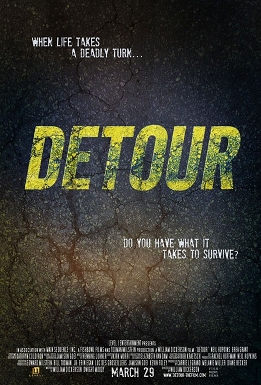Detour is one of the most punishing movies I've ever had to review. Even worse, it shamelessly rips off one of my favorite movies of the last decade. What could have made a compelling short drags on for nearly 90 minutes until you're hoping either the protagonist or yourself would just die already.
The ostensible hero"”though he's easily the douchiest character I've seen onscreen since Ralph Macchio's nemesis in The Karate Kid"”is Jackson, an insufferable ad exec who becomes trapped after a mudslide submerges his Jeep Cherokee. He does his best to improvise a means of escape while staving off insanity, hunger, and his impending doom.
At this point, it's pretty obvious that this movie is essentially a rip-off of 127 Hours. But Detour doesn't have any of the depth. Nor does it have an anchor like James Franco or a director like Danny Boyle. What it does have is a whole host of clichés to check off, including having Jackson go through the five stages of grief and lament his rocky relationship with his girlfriend.
127 Hours made us sympathize with the trapped man, then panned out to reveal that maybe he wasn't such a great guy. But Detour opens with a pretentious proclamation: a flash-forward in which Jackson confesses, "I'd describe this as being born again, but not in a religious way." The film cuts back and forth to old videos (from his iPhone) and memories from just before the crash, but every single scene reveals what a worthless scumbag this guy is. There's never a moment that makes your root for his escape.
And somehow, even though he's totally alone in this car, the dude never shuts up. Not for a second. Granted, there has to be some dialogue to keep the movie running, but 127 Hours found a way to use quiet to its advantage. Detour only manages to be as loud as possible. In one scene, Jackson literally goes through his car's inventory out loud, "One Maglite, two camping chairs, one tent."
I must give Detour some credit for its nifty special effects given its limited budget, but that's all I can give it. The acting, though committed, isn't particularly good. And when you've only got but two onscreen cast members, that's sure to sink your film.
Detour was an agonizing ordeal. But at least it's over now.

